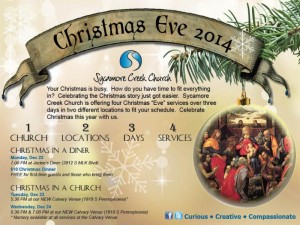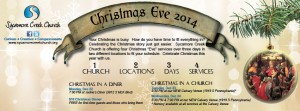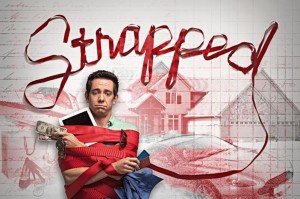
The First Carols of Christmas – The Angels’ Song*
Sycamore Creek Church
Christmas Eve, 2014
Tom Arthur
Angel’s Song: Luke 2:8-14 NRSV
In that region there were shepherds living in the fields, keeping watch over their flock by night. Then an angel of the Lord stood before them, and the glory of the Lord shone around them, and they were terrified. But the angel said to them, Do not be afraid; for see—I am bringing you good news of great joy for all the people: to you is born this day in the city of David a Savior, who is the Messiah, the Lord. This will be a sign for you: you will find a child wrapped in bands of cloth and lying in a manger. And suddenly there was with the angel a multitude of the heavenly host, praising God and saying, Glory to God in the highest heaven, and on earth peace among those whom he favors!
Merry Christmas Friends!
What do you expect at Christmas? Often we don’t get whatever it is that we expect. I came across this prank that Jimmy Kimmel got his viewers to play on their kids. He asked them to give their kids the worst Christmas present. This is what happened:
I kind of cringe watching that video. It feels a bit cruel at times. But it makes a good point, whatever we get at Christmas is often not quite what we were expecting. It even feels cruel at times. Sometimes this is because our expectations are so high that they can’t realistically be met. Or sometimes it’s because we just have the wrong expectations. Did you catch that the angels came to the shepherds “by night”? Here’s a problem I want to deal with tonight:
Christmas can be a very dark time.
I think Christmas acts like a magnifier. It magnifies the good, but it also magnifies the bad. So if things are generally going well in your life, then Christmas makes the good even better. But if things are generally going bad in your life, then Christmas makes the bad even worse!
Christmas can be a very dark time. This is the case literally. December 21st is the winter solstice and that’s the shortest day of the year. In the darkness of this time of the year, many suffer from S.A.D. (Seasonal Affective Disorder). For others Christmas is an emotionally dark time. Maybe you’re still grieving from a death in the family. Maybe this is the first Christmas you’ve had without a loved one. Or maybe an addiction is wreaking emotional havoc in your life. Or perhaps you’re struggling with something like depression. Christmas can also be dark relationally. Maybe your family is broken or maybe you don’t have any family and you’re just plain lonely. For others of us Christmas is a dark time financially. We have no money to celebrate Christmas or we have spent too much money celebrating Christmas and have taken on way too much debt to make Christmas fit our expectations. For many of us, Christmas is a dark time.
Christmas isn’t a celebration because everything is right with the world. We need Christmas for the very fact that we’re in the dark. The circumstances of Jesus’ birth are certainly in the dark. Jesus is born in poverty, placed in a barn feeding trough. He is born to an unwed teenage girl who lived in the affordable housing section of her day. The first people invited to Christmas were the night-shift shepherds. Shepherds were kind of like the garbage collection job of their day. And it wasn’t just any shepherds invited to Christmas. It was the night-shift grave-yard shift shepherds.
Maybe this Christmas is the worst Christmas or this year has been the worst year you’ve ever had. When you’re walking through your worst Christmas ever, where do you turn? If you don’t naturally turn to the story of the birth of the savior, then I’m even more glad you’ve come here tonight, to hear this story of Christmas. It’s my hope that in the midst of the darkness you might find some peace in the birth of Jesus. This leads to a basic question I want to deal with tonight:
Do you have more peace than you did last year?
Do you know anyone named Irene? Irene is Greek for “peace.” “Irene” was popular at the turn of the 20th century but then fell out of favor. It’s making a comeback though at the turn of the 21st century. Irene is the word that Luke uses in the angels song:
Glory to God in the highest heaven,
and on earth peace among those whom he favors!
Peace means something that was once broken or fractured has been brought back together. In the New Testament portion of the Bible (that’s the part of the Bible that comes after Jesus’ birth), there are ninety-two different instances when the word “Irene” is used. About half of those references to peace refer to peace with God and the other half refer to peace between humans. I want to explore both tonight.
Peace with God
What does it mean to have peace with God? I’ll never forget Barb Smith. Barb came to our church in my first year of being pastor here. SCC welcomes everyone, but we tend to attract a younger crowd. Barb’s silver hair stuck out a bit. We send $5 gift cards to first time guests so I sent her a card. She sent it back and told me to give it someone else. Barb came back several weeks in a row and then I didn’t see her much. So a couple of weeks later I called her. When she picked up her phone she was in Missouri visiting family. She told me that she had just been diagnosed with terminal pancreatic cancer and was given three to four months to live. She was doing some last visiting with her family. The peace in her voice over the phone was palpable. I asked her if I could pray with her on the phone, and she really appreciated that, but what I really wanted to do was to ask this woman who seemed to have so much peace in the face of her imminent death to pray for me. A couple of weeks later she was back to her home in Lansing and asked me to meet with her to plan her funeral. They train you to plan funerals at seminary, but the training always assumes that the person has already died. While I sat in Barb’s living room planning her funeral with her, I saw again the peace that she had. There was some fear of the dying process and the pain involved, but Barb was not afraid of death. Her trust and hope was in Jesus, who also died but was raised from the dead by the power of God.
Friends, to be at peace with God means entrusting our life and even our death into the hands of God. Being at peace with God means trusting that we have been forgiven through Jesus’ life, death, and resurrection. Being at peace with God means receiving the peace that passes understanding, a peace so deep that even when we look death in the face, we know that Jesus has already walked through the valley of the shadow of death and will walk alongside us too.
The angels said that “A Savior” would be born, but what will the savior save us from? During Jesus’ time, Israelites probably hoped to be saved from the Roman Empire. If you were around during the American Revolution, you might want to be saved from the British Empire. Today, if you are black you might want to be saved from the police. But Jesus doesn’t really promise to save us from any of these things. He promises to save us from us, from ourselves. Through Jesus we are saved from our narcissism that makes everything about ourselves. We are saved from our unforgiveness, which is like drinking rat poison and hoping the rat dies. We are saved from our bitterness that turns any joy into rottenness. We are saved from our prejudice and racism that steals the gifts of a rich diversity in our relationships. Ultimately we are saved from our rebellion from God, a rebellion that cuts us off from our creator, the very source of our being. At Christmas we cannot forget that Jesus is born to ultimately die, a death that rescues us from ourselves.
So here’s a big question for you this Christmas:
Are you more at peace with God than you were last year?
Peace with others
I mentioned that there are ninety-two references to peace in the New Testament. About half speak of peace with God, and half speak about peace between humans. So how are things going living at peace with those around you? What are you doing to push back the darkness? To bring peace to this world?
Sometimes we get really tripped up on the whole “world peace” thing. Right? I mean, who can really bring about world peace? We pray for it. We hope for it. But that prayer and hope is so big that we kind of give up on even trying. I like what Mother Teresa had to say about it. She encouraged us to do small things with great love. Small things don’t often seem like they’re fighting back the darkness but they may do more than you can imagine.
One of my favorite movie series is wrapping up this month: The Hobbit. Hobbits are small creatures about half the size of a normal human being. They’re called “Halflings” because of their size. They don’t seem like creatures who would save the world. They’re too small. But Gandalf the wizard sees something powerful in their smallness:
Gandalf says that Saruman, another wizard, “believes it is only great power that can hold evil in check, but that is not what I have found. I have found it is the small everyday deeds of ordinary folk that keep the darkness at bay.”
Jesus lived and taught about peace in these small kinds of ways. He taught us to love our enemies. This isn’t about warm feelings, but about doing loving things toward them (even when they don’t deserve it). Jesus taught us to forgive our enemies. He taught us to turn the other cheek and to give someone our shoes when they steal our coat. He tells us to forgive over and over again, and the prayer he taught us tells us that we’ll be forgiven in the way that we forgive others. He told us to do acts of mercy to those who are in need. He told the story of a man who is robbed and beaten and thrown on the side of the road. Two church leaders walk by and leave him in the ditch. Then a Samaritan walks by and helps him out. Samaritans were hated by Jews. Jesus is breaking down racial lines and prejudices in this simple story about helping someone who is different than you, even someone who might not do the same thing for you.
Christmas isn’t just about being at peace with God. It’s about being at peace with those around us. So here’s a question for you:
Are you more at peace with others than you were last year?
I find that a benefit of being part of a faith community like SCC, a community that seeks to be curious, creative, and compassionate is that we’re always doing our best to provide opportunities to do small things with great love. This past year small groups socialized and sang carols at local nursing homes. Another small group offered coffee to the homeless or near homeless downtown. Individuals gave food, care, and rides to those stuck at home by health. Together we collected over 5000 items for Compassion Closet, a personal needs bank in Lansing. We served meals and built friendships at Maplewood Women and Children’s Center. We helped organize two different garden work days at North Elementary. Last year at Christmas Eve we received and gave away over $11,000. Over all our years giving away Christmas Eve offerings we’ve received and given away over $46,000. If you add in all the other offerings for missions that take place other than Christmas Eve, the total is more like $176,000 or about $12,000/year! This year our four Christmas Eve offerings will be entirely given away to three things:
1. Our Nicaragua Medical Missions
2. Local Emergency Needs
3. The Imagine No Malaria Campaign
We are seeking to be a compassionate community that is creating more peace in our world through small acts of kindness done with great love. So here’s another question for you this Christmas:
Are you creating more peace in the world than you were last year?
If you don’t know where to begin, then begin with prayer. Begin by asking God to help you have peace. Here’s a prayer that you might find helpful:
God, I want peace. I want peace with you and peace with those around me. Forgive me for the ways I’ve ignored you and not sought to live at peace with others. Give me the peace that passes understanding and help me walk in the way of Jesus so that I might have more peace in my life this year than last. Amen.
Friends, if you’re ready to live at peace with God and peace with others, would you let me know? Drop me an email (tomarthur@sycamorecreekchurch.org) or check out my blog post: So You Want To Follow Jesus.
*This sermon is based on a sermon first preached by Adam Hamilton






Recent Comments